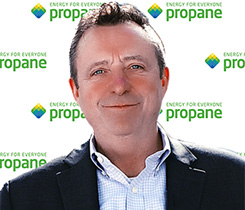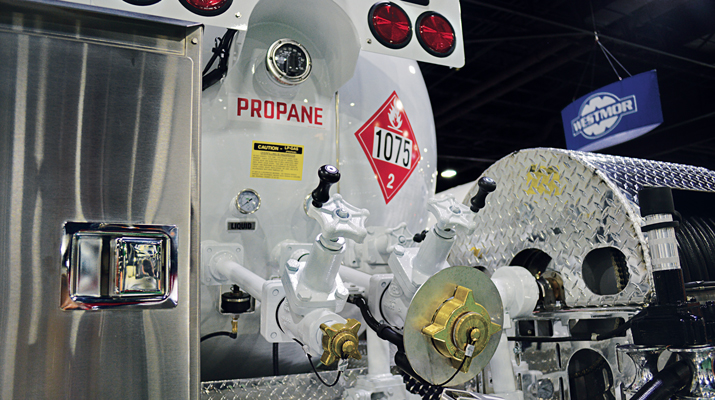Security alert
 When Dennis Dukes of Cornerstone Propane first heard about the Sept. 11 terrorist attacks, he abandoned a business trip and headed back to his office. Conscious of the potential threat of propane in the wrong hands, Dukes hastily drafted a memo to employees, reminding them of emergency-response plans and urging them to double-check the security of storage areas.
When Dennis Dukes of Cornerstone Propane first heard about the Sept. 11 terrorist attacks, he abandoned a business trip and headed back to his office. Conscious of the potential threat of propane in the wrong hands, Dukes hastily drafted a memo to employees, reminding them of emergency-response plans and urging them to double-check the security of storage areas.
“I’m confident that all our managers in the field are prepared and doing what they can to prevent any problems,” says Dukes, the director of technical services for the Lebanon, Mo.-based distributor. “I think most employees are aware of what they should do in the event of an emergency. With the uncertainty of things, I think everyone has the question on their minds of what’s next?”
While propane companies across the country take steps to secure storage facilities and remind drivers to stay alert, all of those contacted indicate they are satisfied their supplies are safe from would-be terrorists. Still, in light of the attacks, they recognize the need to anticipate what previously was unthinkable, and say they welcome opportunities to make improvements.
Some of those recommendations will be coming from a project initiated by the National Propane Gas Association and funded by a $165,000 grant the Propane Education & Research Council approved Oct. 31.
The plan includes security reminders to be mailed to all members, and an audiovisual presentation for meetings. NPGA also will use a portion of the grant to hire a security firm that specializes in plant and industrial security issues to give recommendations on improving security. NPGA hopes to have a report by Feb. 1.
“We want to be prepared when and if the propane industry receives a call from Congress or the Department of Energy, and have a security report in our hand to be able to say we recognize the potential problems, we’ve hired the experts, tightened procedures, and here’s the report,” explains Dan Myers, NPGA executive vice president. “We want to show that we share the government’s concern for securing America.”
NPGA also formed a security task force to provide guidelines for bulk plants, transports, pipelines and terminals. Led by Rob Freeman of Freeman Gas in South Carolina, members include Brad Atkinson of Heritage Propane, Paul Bogan of Sea-3 Inc., Tim Ferns of Rumford Energy Group, David McPhillips of Hillsboro Gas in Tampa, Fla., John Taylor of Taylor Gas in Fairburn, Ga., and Mark Thomas of AmeriGas.
“We recognize this is a hazardous materials industry,” Myers says. “If there are going to be more terrorist activities, it is highly likely it could focus on the hazardous materials industry.”
By now, field officials with the Federal Motor Carrier Safety Administration have visited many companies to review security procedures and make recommendations where appropriate. Agency spokesman David N. Longo emphasized that the visits are not enforcement opportunities, and will not result in compliance reviews or fines.
“They’re more informative and educational,” Long says. “The industry welcomed our people and the law enforcement people who have come in. Everyone’s on the same team here. We’re all united in this.”
FMCSA officials say every hazmat carrier should have a security plan in place, and security concerns should be included in all decision-making processes.
Regarding personnel security, authorities recommend companies:
- recognize that employees can be substantial security risks,
- review driver lists to identify those whose names could be linked to countries
that support terrorists, - ensure that detailed background checks have been performed, looking for
gaps in employment, frequent job changes, aliases used, citizenship and other
aspects, - verify immigration papers for employees who are not U.S. citizens, and
- conduct face-to-face interviews for new employees to “appraise the
personality, character, motivation, honesty, integrity and reliability, and
to judge appearance and characteristics.”
Additional measures should be in place regarding storage and package safety. Authorities recommend:
- adequate lighting for facility grounds,
- storage areas secured by fences or buildings,
- personnel identification cards and badges for access to propane,
- adequate locks,
- records for removal of propane from secure locations, and
- security spot checks of personnel and vehicles.
Drivers, who often travel alone in remote areas, should remain in communication with the main office through cell phones, satellite tracking and surveillance systems, according to the FMCSA. In addition, they should:
- avoid high population centers, including downtown areas,
- lock vehicles when stopped,
- avoid tunnels and bridges where possible, and
- possibly use an electronic engine control that requires a code, in addition
to a key, to start a vehicle.
While the recommendations are being made now because of the war against terrorism, Longo says companies should get used to these procedures.
“Since Sept. 11, what we’re faced with is defining a new kind of transportation normalcy,” he says. “These kinds of activities, and others, may become routine, as unfortunate as that is.”
At AmeriGas, company officials developed a crisis management plan last year in an effort to be proactive. The plan included how to respond to “an incident from outside” such as criminal activity, according to Michael J. Semones, the operations safety manager. Semones, who also serves as chairman of PERC’s Safety and Training Advisory Committee, says his office has stepped up security at all levels.
Lighting around all facilities was improved, background checks on all employees — especially drivers — are more thorough, and valves are closed whenever storage tanks are left unattended.
Before the terrorist attacks employees sometimes left gates open during the day to allow better access by AmeriGas vehicles. Now they are instructed to close the gates as trucks leave. Visitors and customers must come to the office, where employees now will refill tanks rather than let them help themselves. All bobtail fleets have two-way radios or cell phones.
Employees are urged to be alert to anything unusual. At least five times since Sept. 11, AmeriGas employees reported conversations they thought could be relevant to the terrorist investigation, Semones says.
“We have had situations where employees have been approached and been asked questions that the normal person might not ask,” he says. “Employees took descriptions and called local authorities.”
Located just 30 miles from the World Trade Center, officials at Suburban Propane headquarters in Whippany, N.J., were particularly alarmed by the terrorist attacks. Russell T. Rupp, vice president of support services, is reluctant to publicly identify areas where security might need to be improved.
“We certainly have security, but I hate to elaborate because it gives someone who’s looking to do something a roadmap about what they have to defeat or overcome,” he explains.
The company’s supply is secure because employees have always been diligent about restricting access, he says.
“We have a heightened awareness like everyone else does, but as far as extraordinary measures, we don’t feel any extraordinary measures are necessary,” Rupp says. “We do what’s prudent and what makes good sense. I hate to list them all out because I don’t want to give someone a checklist.”
Safety managers said their jobs once focused on the correct handling of propane to prevent accidents, with security issues being reviewed once or twice a year. Cornerstone Propane’s Dukes said security is now reviewed constantly for ways in which propane might be used deliberately to start fires or explosions.
In addition to the FMCSA visits, Cornerstone Propane is sending its six area safety managers to conduct abbreviated audits of each of the 265 locations across the United States. Previously, field managers performed annual self-audits.
“I think (drivers) are always aware…of safety, but security wasn’t necessarily a big concern in the past,” Dukes says.
Despite the expense of such measures, such as satellite tracking systems and electronic engine, AmeriGas’s Semones says there is little choice.
“In this day and age, you can’t get comfortable,” he says. “I don’t think you can put too high a price on safety and security. It’s
part of the business.”
Personnel Security
In the area of personnel security, authorities recommend companies:
- recognize that employees can be substantial security risks,
- review driver lists and identify those whose names could be linked to countries
that support terrorist activities, - ensure that detailed background checks have been performed, looking for
gaps in employment, frequent job changes, aliases used, citizenship and other
aspects, - verify immigration papers for employees who are not U.S. citizens, and
- conduct face-to-face interviews for new employees to “appraise the
personality, character, motivation, honesty, integrity and reliability, and
to judge his appearance and personnel characteristics.”
Companies near Ground Zero lend supplies, helping hand
By Jennifer A. Webb
Two companies based on the fringe of Manhattan, N.Y., contributed propane and volunteer time to the relief work that followed the Sept. 11 terrorist attacks at the World Trade Center.
Suburban Propane, in Whippany, N.J., has donated a steady supply of 10, 100-pound cylinders to each of two staging areas in lower Manhattan.
The propane is used to fuel temporary kitchens at the Brooklyn Navy Yard and the Jacob Javitz Center, where rescue workers come to rest between shifts, get a meal and receive instructions. The cylinders are rotated every third day, said Robert M. Plante, vice president of finance and treasurer.
“It’s our little piece of helping out America,” he says.
With headquarters 30 miles from the World Trade Center, Suburban employees had some connection to about 30 people who died in the towers’ collapse — although none of those were direct links to those in the company.
Plante said views of the Ground Zero site are hard to appreciate from television reports.
“You’ve got to see it to believe it,” he says. “It’s unbelievable.”
Even though Mark A. Alexander, the company CEO, agreed immediately to donate the propane, authorities feared further terrorist attacks and prevented the fuel from crossing bridges into the city for the kitchens until the second day, Plante says.
At Paraco Gas in Purchase, N.Y., company CEO Joe Armentano volunteered on behalf of the Westchester County chapter of the Red Cross. Armentano, a five-year board member who normally handles financial development, manned the county’s
Emergency Office of Control for the county. Paraco Gas, which is about 20 miles from the heart of New York City, donated some propane for the effort, and is matching employee donations.
Armentano worked the night of the attacks and the three days that followed, helping to direct donation offers and provide housing for out-of-town rescue workers. While he was working, former President Bill Clinton, who lives in Westchester County, and his daughter Chelsea visited the county building and spent 45 minutes with volunteers.
“The magnitude of the emotion and the outpouring of help from people wanting to volunteer, I’ve never seen in my lifetime,” Armentano says. “I had a very small role in it but one, I thought, at least I felt like I could do something.”
















